CST Blog
CST Antisemitic Incidents Report for January-June 2018 published today
26 July 2018
CST has today published its Antisemitic Incidents Report for January to June 2018, which can be downloaded here.
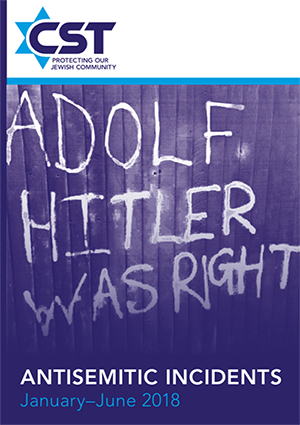
This report shows that the number of antisemitic hate incidents reported to CST in the UK fell by 8 per cent in the first six months of 2018 compared to the same period in 2017. However, the total of 727 antisemitic incidents recorded by CST in the first six months of 2018 was the second-highest total CST has ever recorded for the January to June period of any year. The highest ever total for this period was the 786 incidents recorded in the first half of 2017, which was the highest total CST has ever recorded for the January to June period and was part of a record annual total of 1,414 antisemitic incidents during the whole calendar year of 2017. CST has recorded antisemitic incidents since 1984.
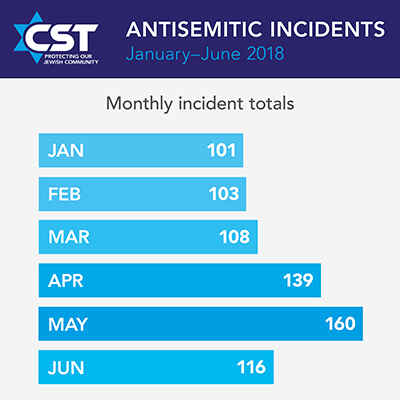
A further 340 reports of potential incidents were received by CST in the first six months of 2018, but were not deemed to be antisemitic and are not included in this total of 727 antisemitic incidents. Many of these 340 potential incidents involved suspicious activity or possible hostile reconnaissance at Jewish locations; criminal activity affecting Jewish people and buildings; and anti-Israel activity that did not include antisemitic language, motivation or targeting.
CST recorded over 100 antisemitic incidents in every one of the six months from January to June 2018, continuing a pattern of historically high monthly totals exceeding 100 incidents in all but two months since April 2016. This is unprecedented: for comparison, CST only recorded monthly totals above 100 incidents on six occasions in the decade prior to April 2016. This sustained high level of antisemitic incidents suggests an enduring situation in which people with antisemitic attitudes appear to be more confident to express their views; while incident victims and reporters may be more motivated to report the antisemitism they experience or encounter.
The two highest monthly totals in the first half of 2018 came in April and May, which saw 139 and 160 antisemitic incidents respectively. It is likely that these higher monthly totals were partly caused by reactions to political events in the UK and overseas, involving the Labour Party and violence on the border of Israel and Gaza, during those months.
The issue of antisemitism in the Labour Party attracted significant media and political attention from late March into April 2018. CST recorded 34 antisemitic incidents in the first six months of 2018 that included explicit references to these events in the Labour Party, of which none occurred in January or February but 20 were recorded in March and April. Also in April and May, several Palestinians were killed and many injured in violence connected to protests at the border between Israel and Gaza. CST recorded 77 antisemitic incidents in the first half of 2018 that showed anti-Israel motivation alongside antisemitism, compared to 49 during the same period in 2017. Of the 77 antisemitic incidents of this type in the first six months of 2018, 63 were recorded in April, May and June, while only 14 occurred in the first three months of the year. The 160 incidents recorded by CST in May is the highest monthly total CST has recorded since August 2014, when Israel and Hamas last fought a sustained conflict over Gaza and is the fourth-highest monthly total CST has ever recorded.
CST recorded 163 antisemitic incidents that involved social media in the first six months of 2018, comprising 22 per cent of the overall total of 727 incidents, compared to 145 incidents on social media in the first half of 2017 (18 per cent of the total). These totals are indicative and are likely to understate the scale of the problem: targeted campaigns directed at individual victims often involve dozens of social media accounts sending hundreds or even thousands of tweets, images or posts within a concentrated timespan. Incidents involving social media are only recorded by CST if they have been reported by either the victim or a witness; if the comment shows evidence of antisemitic content, motivation or targeting; and if the offender is based in the United Kingdom or has directly targeted a UK-based victim. There may be a correlation between the extent of antisemitism on social media and the kind of politically-motivated antisemitic incidents recorded in increased numbers by CST in April and May 2018. The number of incidents on social media recorded by CST in the second quarter of 2018 was roughly double the number recorded in the first three months of the year; whereas incidents involving verbal abuse – which is more likely to reflect street-level anti-social behaviour rather than being politically motivated – only increased by 23 per cent over the same period.
CST recorded a 26 per cent decrease in the number of violent antisemitic assaults, from 80 in the first six months of 2017 to 59 in the first half of 2018. None of these violent incidents were classified by CST as ‘Extreme Violence’, which would mean they involved potential grievous bodily harm (GBH) or a threat to life.
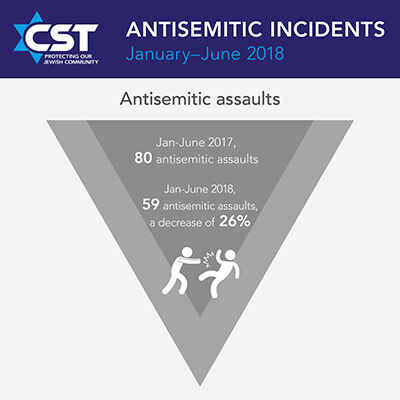
The most common single type of incident recorded by CST in the first six months of 2018 involved verbal abuse randomly directed at visibly Jewish people in public. In 180 incidents, the victims were Jewish people, male or female, attacked or abused while going about their daily business in public places. In at least 118 incidents, the victims were visibly Jewish, usually due to their religious or traditional clothing, school uniform or jewellery bearing Jewish symbols.
There were 43 incidents of Damage & Desecration of Jewish property in the first six months of 2018; 544 incidents of Abusive Behaviour, including verbal abuse, antisemitic graffiti, antisemitic abuse via social media and one-off cases of hate mail; 53 direct antisemitic threats; and 28 cases of mass-mailed antisemitic leaflets or emails.
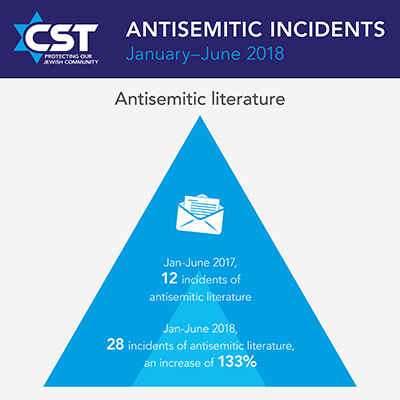
Three-quarters of the 727 antisemitic incidents were recorded in Greater London and Greater Manchester, the two largest Jewish communities in the UK. CST recorded 419 antisemitic incidents in Greater London in the first half of 2018, a fall of 2 per cent from the 428 incidents recorded in London in the first half of 2017. In Greater Manchester, CST recorded 124 antisemitic incidents, a fall of 17 per cent from the 149 incidents recorded there in the first half of 2017. Beyond these two centres, CST recorded 184 antisemitic incidents in 65 different locations around the UK, including 27 in Hertfordshire, 18 in Gateshead, 11 in Leeds, 9 in Glasgow, 7 in Birmingham and 6 in Liverpool.
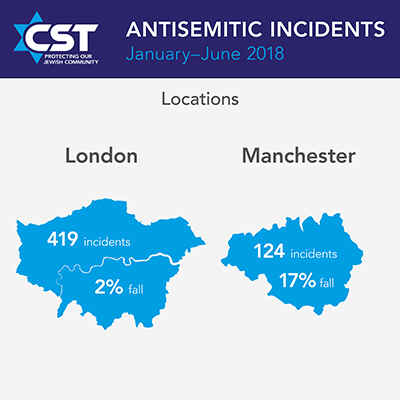
CST Chief Executive David Delew said:
“Any fall in antisemitism is welcome, but these are the second worst figures ever and continue a trend that has now lasted for over two years. This antisemitism is not a random event, it reflects the state of British politics and wider society. Each month we are seeing over 100 antisemitic incidents and many more go unreported. We will keep working with all of our partners inside and outside the Jewish community to do all we can against antisemitism.”
National Police Chiefs’ Council Lead for Hate Crime, Assistant Chief Constable Mark Hamilton said:
“We are grateful to CST for the depth of work that goes into preparing these reports and also for the work its staff and volunteers do in support of victims. We know that all strands of hate crime are under-reported and trusted charities, such as CST, provide a valuable alternative option for those victims who do not wish to report directly to the police. We have a formal Information Sharing Agreement in place which ensures that their work informs policing decisions, in real time, in order to help protect our communities. No one should have to face antisemitic hate crime and I would encourage anyone who does to report it, either to the CST or to the police by dialling 101 or online at www.report-it.org.uk"
Download a full copy of CST’s report here.
Read More

Antisemitic Incidents Report January-June 2025
6 August 2025

Love since 7 October
14 February 2025

Antisemitic Incidents Report 2024
12 February 2025